Related Research Articles

The Moody Blues were an English rock band formed in Birmingham in May 1964. The band initially consisted of drummer Graeme Edge, guitarist/vocalist Denny Laine, keyboardist/vocalist Mike Pinder, multi-instrumentalist/vocalist Ray Thomas, and bassist/vocalist Clint Warwick. Originally part of the British beat and R&B scene of the early–mid 1960s, the band came to prominence with the UK No. 1 and US Top 10 single "Go Now" in late 1964/early 1965. Laine and Warwick left the band by the end of 1966, being replaced by guitarist/vocalist Justin Hayward and bassist/vocalist John Lodge. They embraced the psychedelic rock movement of the late 1960s, with their second album, 1967's Days of Future Passed, being a fusion of rock with classical music that established the band as pioneers in the development of art rock and progressive rock. It has been described as a "landmark" and "one of the first successful concept albums".

The Zombies are an English rock band formed in St Albans in 1961. Led by keyboardist/vocalist Rod Argent and vocalist Colin Blunstone, the group had their first British and American hit in 1964 with "She's Not There". In the US, two further singles—"Tell Her No" in 1965 and "Time of the Season" in 1968—were also successful.

Paul McCartney and Wings, often billed simply as Wings, were an English-American rock band formed in 1971 in London by former Beatles bassist and singer Paul McCartney, his wife Linda McCartney on keyboards, session drummer Denny Seiwell, and former Moody Blues guitarist Denny Laine. Wings were noted for their commercial successes, musical eclecticism and frequent personnel changes; going through three lead guitarists and four drummers. However, the core trio of the McCartneys and Laine remained intact throughout the group's existence.
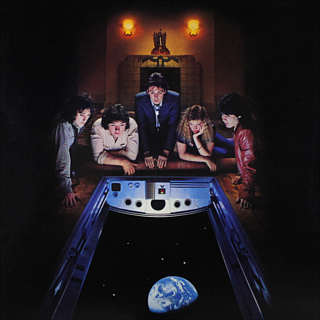
Back to the Egg is the seventh and final studio album by the British–American rock band Wings, released in June 1979 on Parlophone in the UK and Columbia Records in North America. Co-produced by Chris Thomas, the album reflects band leader Paul McCartney's embracing of contemporary musical trends such as new wave and punk, and marked the arrival of new Wings members Laurence Juber and Steve Holley. Back to the Egg adopts a loose conceptual theme around the idea of a working band, and its creation coincided with a period of considerable activity for the group, which included making a return to touring and work on several television and film projects.
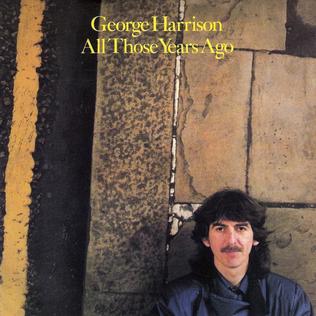
"All Those Years Ago" is a song by the English rock musician George Harrison, released in May 1981 as a single from his ninth studio album Somewhere in England. Having previously recorded the music for the song, Harrison tailored the lyrics to serve as a personal tribute to his former Beatles bandmate John Lennon, following the latter's murder in 1980. Ringo Starr is featured on drums, and Paul McCartney overdubbed backing vocals onto the basic track. The single spent three weeks at number 2 on the US Billboard Hot 100, behind "Bette Davis Eyes" by Kim Carnes, and it peaked at number 13 on the UK Singles Chart. It also topped Canada's RPM singles chart and spent one week at number 1 on Billboard's Adult Contemporary listings.

Wild Life is the debut studio album by the British-American rock band Wings and the third studio album by Paul McCartney after the breakup of the Beatles. The album was mainly recorded in seven sessions between 24 July and 4 September 1971, at EMI Studios by McCartney, his wife Linda, session drummer Denny Seiwell, whom they had worked with on the McCartneys' previous album Ram, and guitarist Denny Laine, formerly of the English rock band the Moody Blues. It was released by Apple Records on 7 December in the UK and US, to lukewarm critical and commercial reaction.

Red Rose Speedway is the second studio album by the English-American rock band Wings, although credited to "Paul McCartney and Wings". It was released through Apple Records on 5 May 1973, preceded by its lead single, the ballad "My Love". By including McCartney's name in the artist credit, the single and album broke with the tradition of Wings' previous records. The change was made in the belief that the public's unfamiliarity with the band had been responsible for the weak commercial performance of the group's 1971 debut album Wild Life.

Colin Edward Michael Blunstone is an English singer and songwriter. In a career spanning more than 60 years, Blunstone came to prominence in the mid-1960s as the lead singer of the rock band the Zombies, which released four singles that entered the Top 75 charts in the United States during the 1960s: "She's Not There", "Tell Her No", "She's Coming Home" and "Time of the Season". Blunstone began his solo career in 1969, releasing three singles under a pseudonym of Neil MacArthur. Since then, he has released ten studio albums under his real name. He appears on several albums with the Alan Parsons Project and sang "Old and Wise".
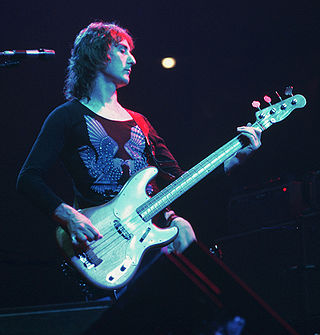
Brian Frederick Hines, known professionally as Denny Laine, was an English musician who co-founded two major rock bands: the Moody Blues and Wings. Laine played guitar in the Moody Blues from 1964 to 1966, and he sang their hit cover version of “Go Now”. While the Moody Blues were on tour with the Beatles in 1965, Laine befriended Paul McCartney, who later asked him to join his band Wings.
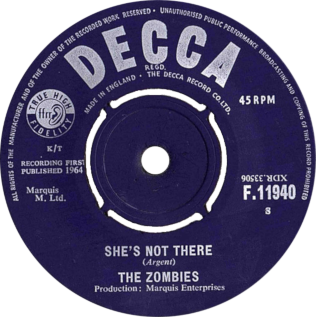
"She's Not There" is the debut single by British rock band the Zombies, written by keyboardist Rod Argent. It reached No. 12 in the UK Singles Chart in September 1964, and No. 2 on the Billboard Hot 100 in the United States at the beginning of December 1964. In Canada, it reached No. 2.
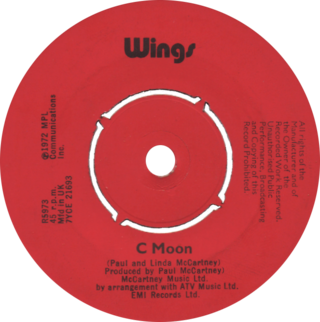
"C Moon" is a song with a reggae beat, written by Paul and Linda McCartney and performed by Wings. It was released as a double A-side with "Hi, Hi, Hi" in 1972. The single reached No. 5 on the UK Singles Chart and since "Hi Hi Hi" was banned by the BBC, "C Moon" received much airplay in the United Kingdom. In the United States, "C Moon" did not appear on any of the major record charts.

"My Love" is a song by the British–American band Paul McCartney and Wings that was first released as the lead single from their 1973 album Red Rose Speedway. It was written by Paul McCartney as a love song to his wife and Wings bandmate Linda. The single marked the first time that McCartney's name appeared in the artist credit for a Wings record, after their previous releases had been credited to Wings alone. Released on 23 March 1973, the song topped the Billboard Hot 100 chart in the US for four weeks and peaked at number 9 on the UK Singles Chart. The single was viewed as Wings' first significant success in the US and helped Red Rose Speedway achieve commercial success.

"Band on the Run" is a song by the British–American rock band Paul McCartney and Wings, released as the title track to their 1973 album Band on the Run. The song was released as a single in April 1974 in the US and in June 1974 in the UK, following the success of "Jet", and became an international chart success. The song topped the charts in the United States, also reaching number 3 in the United Kingdom. The single sold over one million copies in 1974 in America. It has since become one of the band's most famous songs.
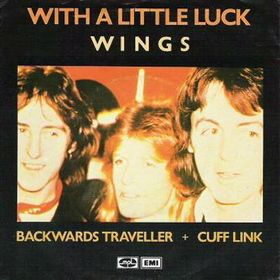
"With a Little Luck" is a single by the band Wings from their 1978 album London Town.
In the summer of 1972, Paul McCartney's newly formed band, Wings, set out on a concert tour of Europe, in a double decker bus, WNO 481.

Christopher Taylor White is an English musician. He came to prominence in the mid-1960s as the bass guitarist and occasional lead vocalist of the rock band The Zombies. White is one of the main composers of the Zombies' music, and made major lyrical contributions to the band's songs. He was inducted into the Rock and Roll Hall of Fame in 2019 as a member of the Zombies.

Japanese Tears is the third album by guitarist Denny Laine, released shortly before the demise of Paul McCartney's band Wings, of which Laine was a member. The album was released in 1980.

"Seaside Woman" is a 1977 single by Wings released under the pseudonym Suzy and the Red Stripes. It charted at number 59 in the US and in the UK at number 90 in 1986.

Ennismore is the second solo studio album by the English singer Colin Blunstone of rock band the Zombies. The name of the album comes from Ennismore Gardens, a square in Knightsbridge where Blunstone was living; the name being a variant spelling of the island Inishmore.

Michael Thomas Pinder is an English musician. He is a founding member and the original keyboard player of the rock group the Moody Blues. He left the group following the recording of the band's ninth album Octave in 1978. Pinder is renown for his technological contributions to rock music, most notably in the development and emergence of the Mellotron in the 1960s decade. In 2018, he was inducted into the Rock and Roll Hall of Fame as a member of the Moody Blues. He is the last surviving member of the group's original five members.
References
Citations
- ↑ Webb 2013, p. 192.
- ↑ "Episode Six - Cornflakes & Crazyfoam". Deep Purple Appreciation Society. Retrieved 1 April 2022.
- ↑ "Say You Don't Mind - Orange Bicycle". AllMusic. Retrieved 1 April 2022.
- 1 2 Webb 2013, p. 193.
- ↑ Rooksby 2007, p. 135.
- ↑ "Music's Secret Weapons (part two)". The Guardian. 6 October 2006. Retrieved 14 April 2022.
- ↑ Webb 2013, pp. 192–193.
- ↑ "Say You Don't Mind". Official Charts Company. Retrieved 1 April 2022.
- ↑ Badman 1999, pp. 76, 99.
- ↑ "Japanese Tears". AllMusic. Retrieved 1 April 2022.
- ↑ "Denny Laine - Performs the Hits of Wings". AllMusic. Retrieved 1 April 2022.
Sources
- Rooksby, Rikky (2007). Arranging Songs: How to Put the Parts Together. Hal Leonard. ISBN 978-0-879-30896-4.
- Webb, Robert (2013). 100 Greatest Cover Versions: The Ultimate Playlist. McNidder & Grace. ISBN 978-0-857-16057-7.
- Badman, Keith (1999). The Beatles : After The Breakup. ISBN 978-0-711-97520-0.